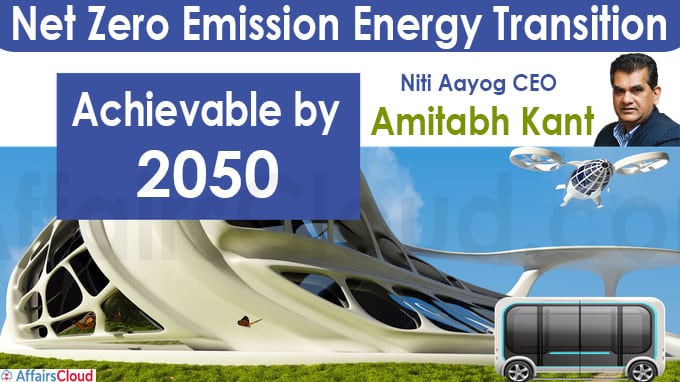 According to the report by ‘India:Transforming to a net-zero emissions energy system’ released by TERI (The Energy & Resources Institute) & Shell (otherwise known as Royal Dutch Shell plc), the Net Zero emissions in energy system in India is achievable by 2050.Amitabh Kant, CEO, NITI Aayog released the report.
According to the report by ‘India:Transforming to a net-zero emissions energy system’ released by TERI (The Energy & Resources Institute) & Shell (otherwise known as Royal Dutch Shell plc), the Net Zero emissions in energy system in India is achievable by 2050.Amitabh Kant, CEO, NITI Aayog released the report.
- The report is one of the first assessments of the challenges that India would face if India were to move towards Net-zero emissions energy system.
Factors needed to achieve the target
- Suitable Policy and innovation driven context for deploying clean energy technologies on a massive scale.
- Development of new fuels, such as liquid biofuels and biogas, as well as hydrogen produced from Electrolysis.
- Carbon Removals (Technology & nature-based solutions) will have a major role in moving towards zero emissions.
Areas of Action – specified by report
The report highlights the transformations needed by India over the next 30 years for India to achieve the goal.
Accelerate Clean Technologies
- Growing the power sector by a factor of more than four in 30 years, dominated by renewables (around 90%).
- Fixing a target of 13% hydrogen in final energy, including as a fuel for industry and transport
- Transform Bioenergy, with liquid biofuels surpassing petroleum products by 2040 to field Industry, Transport & Aviation.
Support energy-efficient and lower-carbon choices
- Invest in processes, technologies and end uses to improve energy intensity per unit of GDP by almost 60% by 2050.
- Adopting economic mechanisms such as carbon trading to facilitate reallocation of capital and resources to support commercialization of new fuels & technologies.
Remove Carbon emissions
- Resort to Carbon sequestration to an extent of around 1.3 Gt CO2 or carbon capture and storage (CCS) to achieve net zero emissions by 2050.
Recent Related News:
i.December 4, 2020, In accordance with the report titled “The Production Gap, 2020” produced by the United Nations Environment Programme (UNEP) the world is planning to produce more than double the amount of Coal, Oil and gas by 2030.
About The Energy & Resources Institute (TERI):
Director General – Dr Vibha Dhawan
Headquarters – New Delhi
About Shell:
Global CEO – Ben Van Beurden
Headquarters – The Hague, Netherlands




